The price is available ON REQUEST
Also known as Carpal Tunnel Decompression Surgery, the procedure is used for treating Carpal Runnel Syndrome. The condition is characterized by compression or increased pressure at the median nerve of the carpal tunnel which passes through the wrists. Carpal tunnel surgery is suggested in case of persistent pain the first three digits (thumb, index as well as middle finger) and ring finger (towards the thumb side). The pain is mostly accompanied by a feeling of numbness or loss of sensation, and tingling sensation. The surgery is very common with more than 500,000 surgeries being performed worldwide annually. On an average, the carpal tunnel surgery cost may vary from below $1000 to above $3979, as it depends on a number of factors.
The procedure is performed only if prolonged conventional treatments and physical therapies go ineffective. The approach of the procedure is to split up the transverse carpal ligaments from that of the volar antebrachial fascia (towards the distal end). The transverse ligament forms the canopy over the carpal tunnel and is primarily the reason for compression of nerve root. Hence, to decompress the area and relieve the candidate from further pain, the separation or release or distension of the ligament is imperative.
Carpal tunnel surgery is one of the most common procedures performed all across the world. However, one must decide on the candidacy to determine eligibility for the procedure. Thus, one can be an ideal candidate if:
The factors that widely affect the carpal tunnel surgery cost are:
| City | Minimum Cost | Maximum Cost |
|---|---|---|
| Bangkok | USD 3010 | USD 4020 |
| Country | Cost | Local Currency |
|---|---|---|
| Hungary | USD 2640 | HUF 920198 |
| India | USD 2630 | INR 218685 |
| Lithuania | USD 4260 | LTL 3919 |
| Poland | USD 6070 | PLN 24523 |
| Singapore | USD 3000 | SGD 4020 |
| South Korea | USD 6000 | KRW 8056140 |
| Spain | USD 6000 | ESP 5520 |
| Thailand | USD 3010 | THB 107306 |
| Tunisia | USD 2000 | TND 6220 |
| Turkey | USD 3000 | TRY 90420 |
| United Arab Emirates | USD 4340 | AED 15928 |
| United Kingdom | USD 2060 | GBP 1627 |
Treatment cost
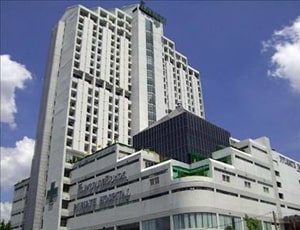
Types of Carpal Tunnel Release in Piyavate Hospital and its associated cost
| Treatment Option | Approximate Cost Range (USD) | Approximate Cost Range (THB) |
|---|---|---|
| Carpal Tunnel Release (Overall) | 3372 - 6758 | 120073 - 246663 |
| Open Carpal Tunnel Release | 2435 - 5400 | 85702 - 197898 |
| Endoscopic Carpal Tunnel Release | 3610 - 6797 | 127453 - 246025 |
SPECIALITIES
FACILITIES & AMENITIES
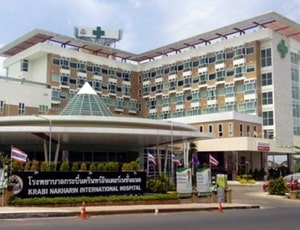
Types of Carpal Tunnel Release in Krabi Nakharin International Hospital and its associated cost
| Treatment Option | Approximate Cost Range (USD) | Approximate Cost Range (THB) |
|---|---|---|
| Carpal Tunnel Release (Overall) | 3368 - 6692 | 119207 - 239661 |
| Open Carpal Tunnel Release | 2499 - 5349 | 86576 - 194771 |
| Endoscopic Carpal Tunnel Release | 3547 - 6760 | 124323 - 244416 |
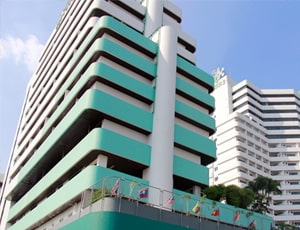
Types of Carpal Tunnel Release in Phyathai 2 International Hospital and its associated cost
| Treatment Option | Approximate Cost Range (USD) | Approximate Cost Range (THB) |
|---|---|---|
| Carpal Tunnel Release (Overall) | 3451 - 6954 | 123687 - 240840 |
| Open Carpal Tunnel Release | 2405 - 5328 | 87313 - 193798 |
| Endoscopic Carpal Tunnel Release | 3542 - 6689 | 126893 - 237531 |
DOCTORS IN 11 SPECIALITIES
FACILITIES & AMENITIES

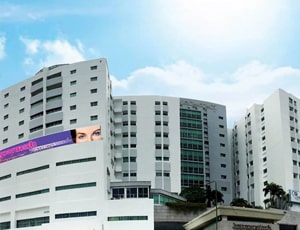
Types of Carpal Tunnel Release in Kasemrad Ramkhamhaeng Hospital and its associated cost
| Treatment Option | Approximate Cost Range (USD) | Approximate Cost Range (THB) |
|---|---|---|
| Carpal Tunnel Release (Overall) | 3367 - 6781 | 123294 - 246858 |
| Open Carpal Tunnel Release | 2404 - 5522 | 87685 - 193144 |
| Endoscopic Carpal Tunnel Release | 3592 - 6740 | 128245 - 242521 |
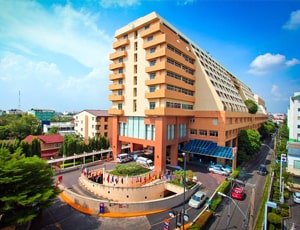
Types of Carpal Tunnel Release in Vejthani Hospital and its associated cost
| Treatment Option | Approximate Cost Range (USD) | Approximate Cost Range (THB) |
|---|---|---|
| Carpal Tunnel Release (Overall) | 3458 - 6671 | 120621 - 243977 |
| Open Carpal Tunnel Release | 2396 - 5466 | 89041 - 191209 |
| Endoscopic Carpal Tunnel Release | 3569 - 6732 | 126182 - 241821 |
DOCTORS IN 13 SPECIALITIES
FACILITIES & AMENITIES
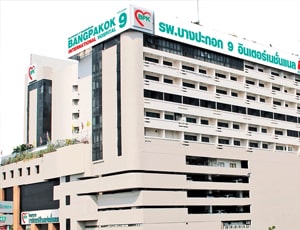
Types of Carpal Tunnel Release in Bangpakok 9 International Hospital and its associated cost
| Treatment Option | Approximate Cost Range (USD) | Approximate Cost Range (THB) |
|---|---|---|
| Carpal Tunnel Release (Overall) | 3384 - 6694 | 120939 - 247250 |
| Open Carpal Tunnel Release | 2439 - 5405 | 88681 - 194147 |
| Endoscopic Carpal Tunnel Release | 3461 - 6683 | 125601 - 243507 |
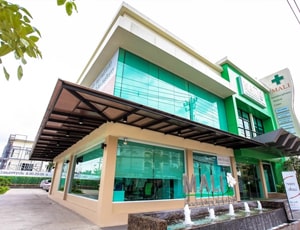
Types of Carpal Tunnel Release in MALI Interdisciplinary Hospital and its associated cost
| Treatment Option | Approximate Cost Range (USD) | Approximate Cost Range (THB) |
|---|---|---|
| Carpal Tunnel Release (Overall) | 3077 - 6139 | 108992 - 218338 |
| Open Carpal Tunnel Release | 2221 - 4910 | 78842 - 175659 |
| Endoscopic Carpal Tunnel Release | 3192 - 6135 | 114184 - 218774 |
DOCTORS IN 12 SPECIALITIES
FACILITIES & AMENITIES
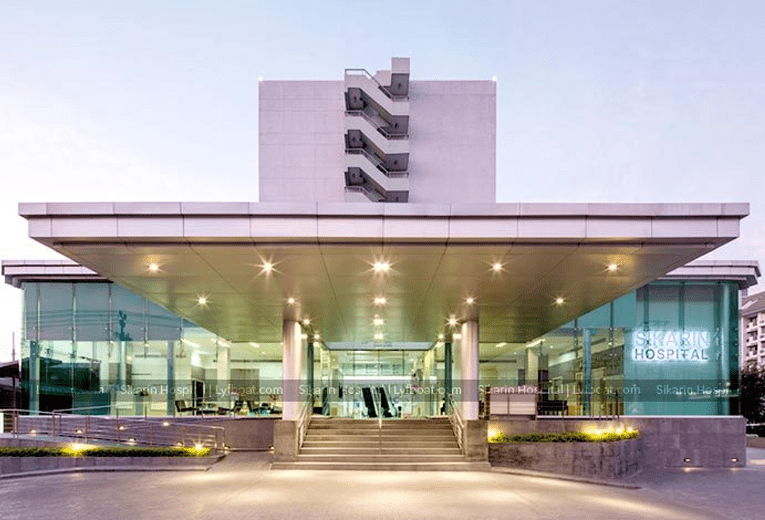
Types of Carpal Tunnel Release in Sikarin Hospital and its associated cost
| Treatment Option | Approximate Cost Range (USD) | Approximate Cost Range (THB) |
|---|---|---|
| Carpal Tunnel Release (Overall) | 3431 - 6707 | 119468 - 246709 |
| Open Carpal Tunnel Release | 2503 - 5427 | 87947 - 196127 |
| Endoscopic Carpal Tunnel Release | 3521 - 6858 | 125409 - 240189 |
SPECIALITIES
FACILITIES & AMENITIES
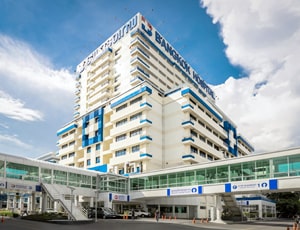
Types of Carpal Tunnel Release in Bangkok Hospital and its associated cost
| Treatment Option | Approximate Cost Range (USD) | Approximate Cost Range (THB) |
|---|---|---|
| Carpal Tunnel Release (Overall) | 3456 - 6739 | 120473 - 238524 |
| Open Carpal Tunnel Release | 2452 - 5534 | 85956 - 191712 |
| Endoscopic Carpal Tunnel Release | 3528 - 6817 | 125075 - 244977 |
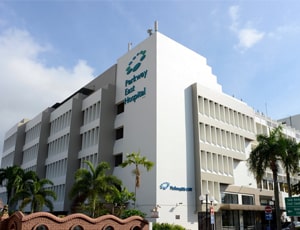
Parkway East Hospital located in Joo Chiat Pl, Singapore is accredited by JCI. Also listed below are some of the most prominent infrastructural details:
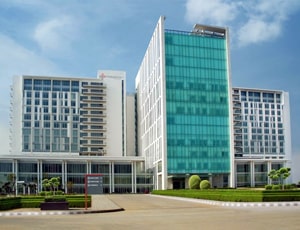
Types of Carpal Tunnel Release in Medanta - The Medicity and its associated cost
| Treatment Option | Approximate Cost Range (USD) | Approximate Cost Range (INR) |
|---|---|---|
| Carpal Tunnel Release (Overall) | 2782 - 4492 | 232726 - 369140 |
| Open Carpal Tunnel Release | 1655 - 3410 | 138776 - 281836 |
| Endoscopic Carpal Tunnel Release | 3163 - 4476 | 257322 - 373805 |
DOCTORS IN 14 SPECIALITIES
FACILITIES & AMENITIES
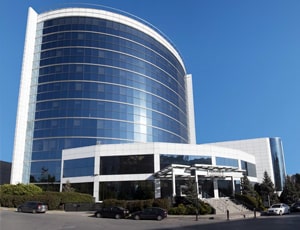
Types of Carpal Tunnel Release in Medicana International Istanbul and its associated cost
| Treatment Option | Approximate Cost Range (USD) | Approximate Cost Range (TRY) |
|---|---|---|
| Carpal Tunnel Release (Overall) | 2848 - 5611 | 83823 - 172695 |
| Open Carpal Tunnel Release | 1990 - 4469 | 61085 - 138065 |
| Endoscopic Carpal Tunnel Release | 2886 - 5556 | 88664 - 169470 |
DOCTORS IN 10 SPECIALITIES
FACILITIES & AMENITIES
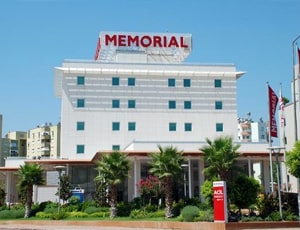
Types of Carpal Tunnel Release in Memorial Antalya Hospital and its associated cost
| Treatment Option | Approximate Cost Range (USD) | Approximate Cost Range (TRY) |
|---|---|---|
| Carpal Tunnel Release (Overall) | 2796 - 5572 | 83338 - 170736 |
| Open Carpal Tunnel Release | 2012 - 4513 | 61985 - 137025 |
| Endoscopic Carpal Tunnel Release | 2928 - 5693 | 86402 - 170871 |
DOCTORS IN 11 SPECIALITIES
FACILITIES & AMENITIES
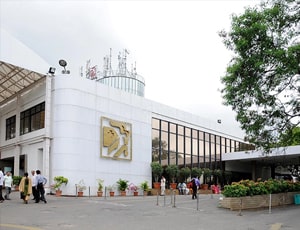
Types of Carpal Tunnel Release in Apollo Hospitals and its associated cost
| Treatment Option | Approximate Cost Range (USD) | Approximate Cost Range (INR) |
|---|---|---|
| Carpal Tunnel Release (Overall) | 2804 - 4486 | 230034 - 364635 |
| Open Carpal Tunnel Release | 1702 - 3349 | 140230 - 280282 |
| Endoscopic Carpal Tunnel Release | 3128 - 4532 | 261576 - 360854 |
DOCTORS IN 14 SPECIALITIES
FACILITIES & AMENITIES
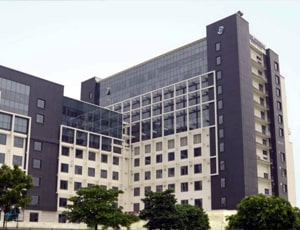
Types of Carpal Tunnel Release in Venkateshwar Hospital and its associated cost
| Treatment Option | Approximate Cost Range (USD) | Approximate Cost Range (INR) |
|---|---|---|
| Carpal Tunnel Release (Overall) | 2536 - 4058 | 208330 - 332673 |
| Open Carpal Tunnel Release | 1521 - 3051 | 125070 - 249409 |
| Endoscopic Carpal Tunnel Release | 2829 - 4043 | 232825 - 331503 |
DOCTORS IN 13 SPECIALITIES
FACILITIES & AMENITIES
The treatment for carpal tunnel syndrome depends on the severity of the condition and the duration of the symptoms. Generally, the physicians first recommend non-surgical interventions such as the use of corticosteroid injections and wrist splints to relieve the symptoms of carpal tunnel syndrome.
A carpal tunnel treatment surgery is recommended in case:
The carpal tunnel treatment surgery is an open technique. The surgeon may make a cut in the transverse carpal ligament that forms the roof of the tunnel. The carpal tunnel treatment allows more room for the median nerve and the tendons to pass through the tunnel. Thereby, the pressure on the nerve is reduced causing relief from the symptoms.
Carpal tunnel surgery is a simple outpatient procedure. You can go to the hospital, get the surgery done, and walk back to home on the same day.
On the day of the surgery, the area to be operated is cleaned with an antiseptic solution to avoid the chances of contracting an infection. The anesthetist administers a local anesthetic injection to numb the wrist area. This is done so that you do not experience any pain during the procedure.
A small cut is made in the palm near to the wrist area. Once the transverse carpal ligament is visible, a small cut is made in the ligament. This relieves the pressure on the nerve. The skin is put back and stitched together in its original position. A bandage is placed on the palm.
The following are the two alternatives to the open carpal tunnel surgery:
Endoscopic carpal tunnel surgery: The surgical procedure is similar to that of open surgery but the entire surgery is performed by looking at the camera. A small incision is made and small instruments with a camera attached to them are placed inside. The incision is small and damage is minimal. It gives you a chance to recover faster than the open technique. The healing is better and minimal pain is felt.
Key hole surgery: In this procedure, a smaller incision than normal is made on the palm. A special instrument with a light at one end and microscope at the other end is placed. This gives the doctor a chance to see the carpal ligament and carefully guide the tools to cut the targeted area.
The symptoms are usually relieved immediately after the surgery or in most cases, within a few months. You may feel numbness in the fingers for the next 15 to 16 hours.
The time you take to recover from carpal tunnel surgery depends on the severity of symptoms you had before the treatment.
Ask your healthcare adviser for the best multiple options and choose the one that meets your expectations
In Thailand, the average starting cost for Carpal Tunnel Release is USD 5000. Many multispeciality hospitals in Thailand that are Healthcare Accreditation Institute, JCI certified are approved and most sought after for treating international patients with Carpal Tunnel Release
Different hospitals have different pricing policy when it comes to the cost of Carpal Tunnel Release in Thailand. Some of the best hospitals for Carpal Tunnel Release offer a comprehensive package that covers the end-to-end expenses related to investigations and treatment of the patient. Typically, the package cost of Carpal Tunnel Release in Thailand includes the expenses related to the surgeon's fee, anesthesia, hospital, meals, nursing and ICU stay. A prolonged hospital stay due to delayed recovery, new diagnosis and complications after surgery may increase the cost of Carpal Tunnel Release in Thailand.
Many hospitals in Thailand perform Carpal Tunnel Release. The top hospitals for Carpal Tunnel Release in Thailand include the following:
While the speed of recovery may vary from patient to patient, they are still required to stay for about 14 days after discharge. During this time, the patient undergoes medical tests and consultations. this is to ensure that the treatment was successful and the patient us safe to return.
Apart from the Carpal Tunnel Release cost, the patient may have to pay for additional daily expenses such as for guest house after discharge and meals. The per day extra expenses in Thailand per person are about USD 50 per person.
The following are some of the best cities for Carpal Tunnel Release in Thailand:
Patients who are interested in availing telemedicine consultation before they travel for Carpal Tunnel Release in Thailand can opt for the same. There are many Carpal Tunnel Release surgeons who offer video telemedicine consultation, including the following:
| Doctor | Cost | Schedule Your Appointment |
|---|---|---|
| Dr. Pibul Itiravivong | USD 121 | Schedule Now |
After the Carpal Tunnel Release takes place, the average duration of stay at the hospital is about 1 days. The doctors team review the patient's recovery during this time with the help of blood tests and imaging scans. Once they feel that everything is on track, the patient is discharged.
There are more than 7 hospitals that offer Carpal Tunnel Release in Thailand. The above listed clinics are approved to perform the surgery and have proper infrastructure to handle Carpal Tunnel Release patients. Apart from good services, the hospitals are known to follow all standard and legal guidelines as dictated by the local medical affairs body or organization.
Some of the best doctors for Carpal Tunnel Release in Thailand are: